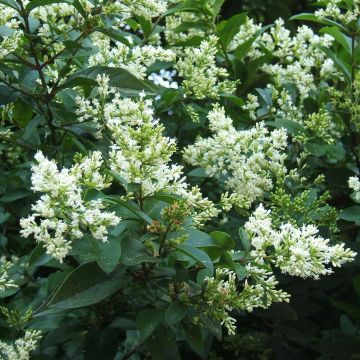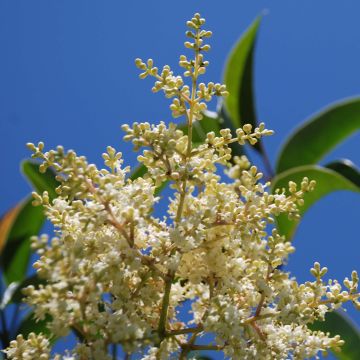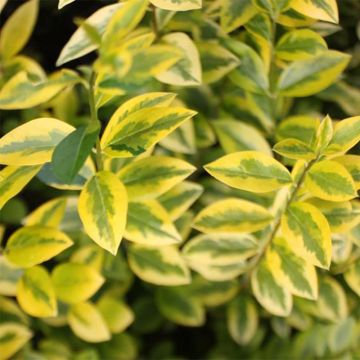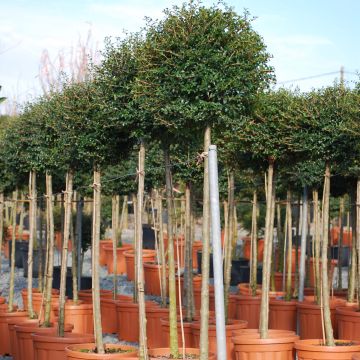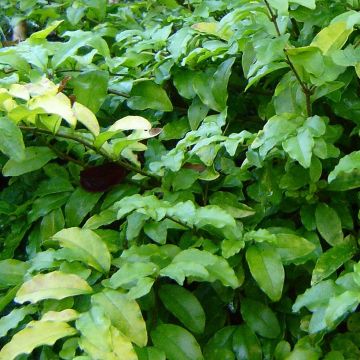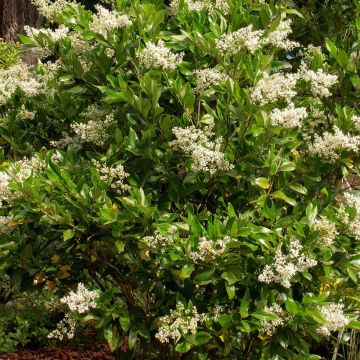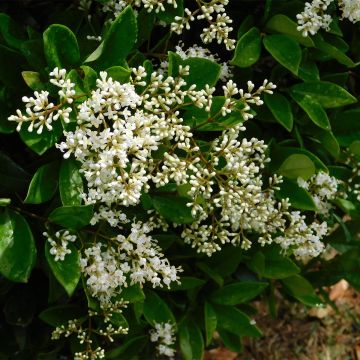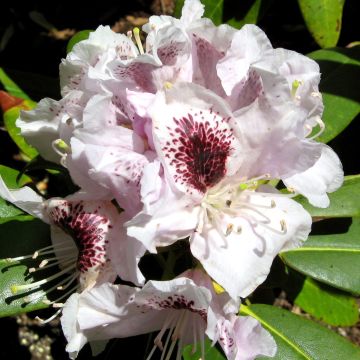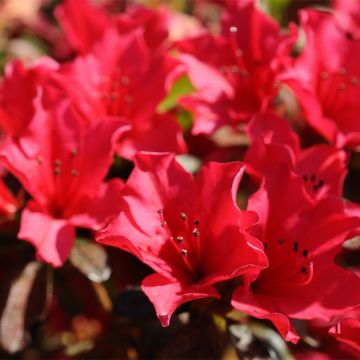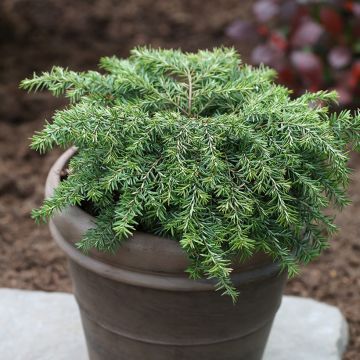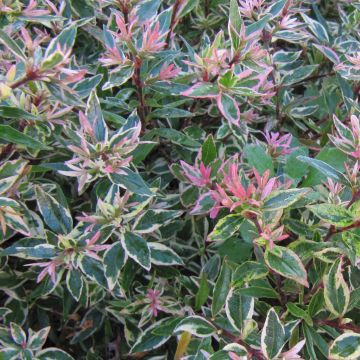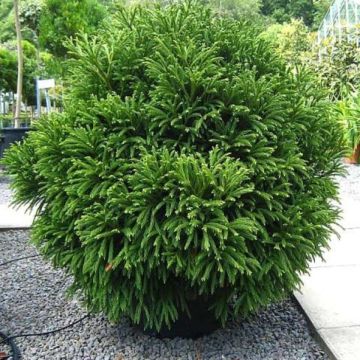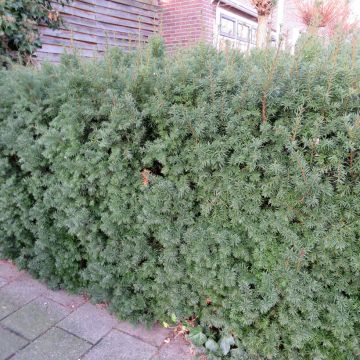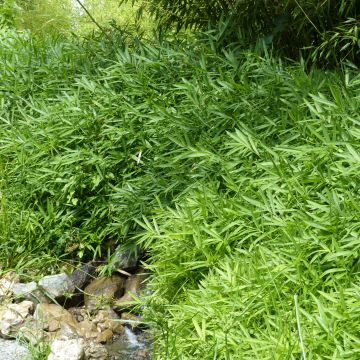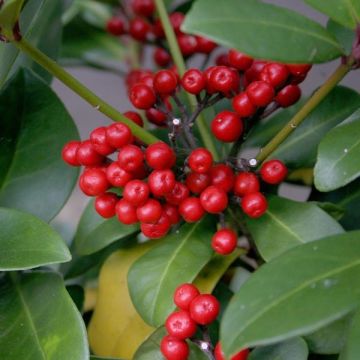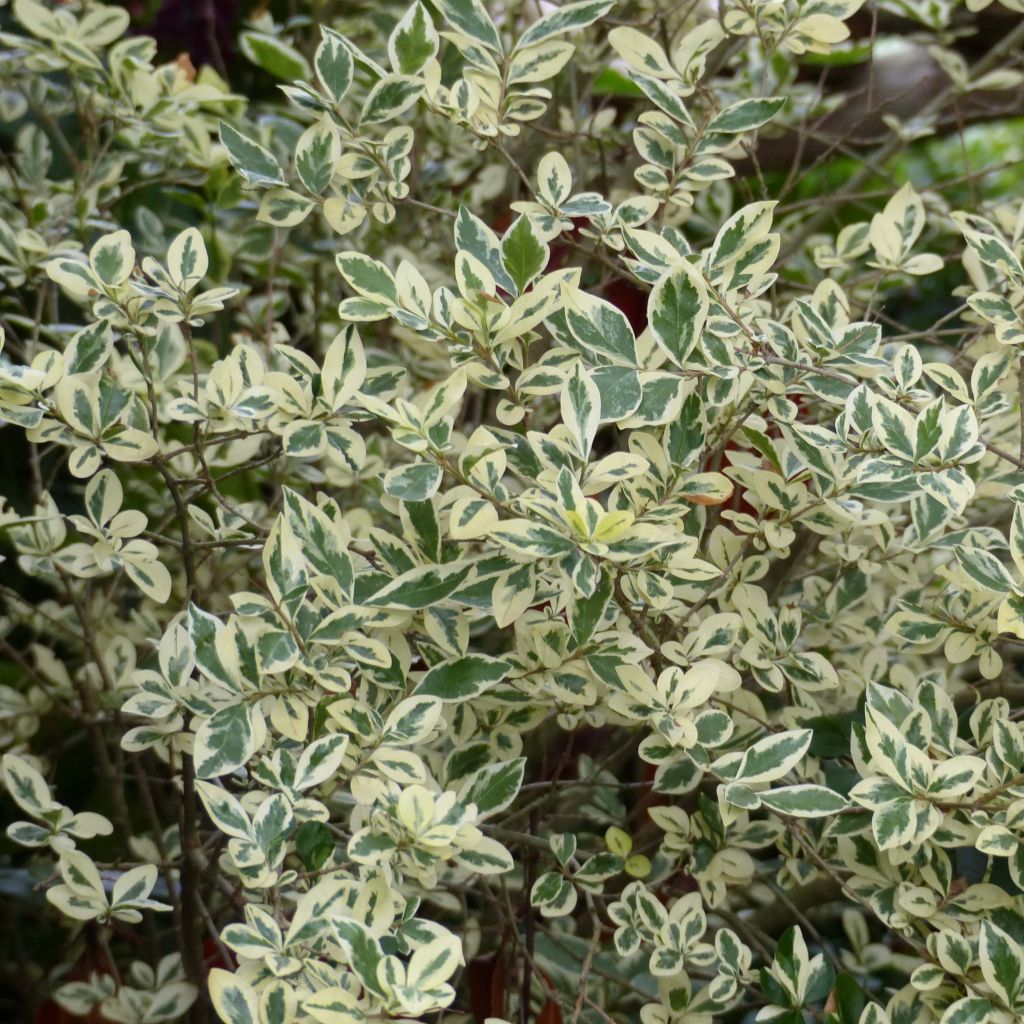

Ligustrum ovalifolium Argenteum - Garden Privet
Ligustrum ovalifolium Argenteum - Garden Privet
Ligustrum ovalifolium Argenteum
Garden Privet, California Privet, Oval-leaf Privet
This item cannot be shipped to the selected country
Delivery charge from €5.90
Delivery charge from €5.90
Delivery to Corse prohibited
More information
Schedule delivery date,
and select date in basket
This plant carries a 24 months recovery warranty
More information
We guarantee the quality of our plants for a full growing cycle, and will replace at our expense any plant that fails to recover under normal climatic and planting conditions.
From €5.90 for pickup delivery and €6.90 for home delivery
Express home delivery from €8.90.
From €5.90 for pickup delivery and €6.90 for home delivery
Express home delivery from €8.90.
Delivery to Corse prohibited: UE law prohibits the import of this plant from mainland France to Corse as part of the fight against Xylella fastidiosa. Please accept our sincere apologies.
More information

Does this plant fit my garden?
Set up your Plantfit profile →
Description
Ligustrum ovalifolium 'Argenteum' is a variety of California privet with variegated cream and green foliage, perfect for bringing light to partially shaded areas of the garden. This evergreen shrub retains its leaves in winter depending on the climate, making it ideal for creating a bright and dense screen that is ornamental for most of the year with its foliage, summer flowering in white panicles, and beautiful autumn fruiting with small black berries that persist until late in the season. With no specific requirements, hardy and adaptable, it will fully play its role in a trimmed hedge, or mixed with other species in an informal hedge.
Ligustrum ovalifolium 'Argenteum' is a variegated mutation of Ligustrum ovalifolium, native to Japan and Korea, not California. It belongs to the Oleaceae family, just like lilacs and forsythia. It is a bushy and dense shrub with a naturally erect habit, supported by long upright and branching stems. This fairly fast-growing variety reaches a height of about 3m (10ft) and a width of 2m (7ft) at maturity. Its foliage is evergreen in mild climates and semi-evergreen elsewhere. It consists of glossy, narrow and ovate, lanceolate leaves, with green margins variegated with white cream, measuring between 3 and 7cm (1 and 3in) in length and appearing early in the season. In June-July, small, highly fragrant and nectar-rich cream-white flowers appear in panicles measuring 5 to 10cm (2 to 4in). They give way in autumn to small spherical black berries, which will persist for part of the winter. The leaves, flowers, and fruits of the privet are toxic to humans and animals if ingested.
Ornamental with its dense, silvery foliage, it can create privacy hedges and windbreaks. It is easy to shape it as desired. It will have a beautiful effect when combined with other trimmed or untrimmed shrubs, playing with the shape and colour of the foliage, in a rustic or more contemporary setting. It also lends itself well to planting in groups, or wild hedges.
It can be planted with other shrubs (purple barberry, photinia, eleagnus, lilac, Japanese kerria, white spirea) in a flowering wild hedge. Enjoy its beautiful foliage and pleasant flowering by letting it grow freely.
Privet roots may hinder the growth of certain perennial plants planted at its base. Precautionary measure should be taken to ensure a sufficient planting distance around it.
It should be noted that this shrub has a very high tolerance to pollution, which makes it valuable in urban gardens.
Properties:
With its highly scented and pollen-rich flowers, this privet contributes to the preservation of bees. Its pollen can be allergenic for some sensitive individuals.
Report an error about the product description
Ligustrum ovalifolium Argenteum - Garden Privet in pictures
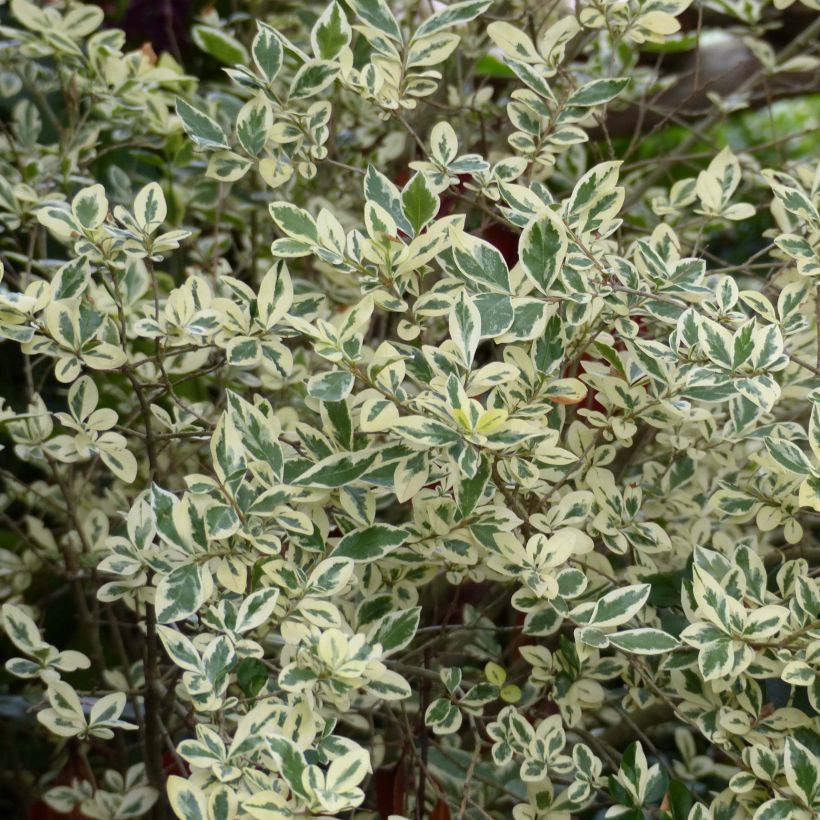

Plant habit
Flowering
Foliage
Botanical data
Ligustrum
ovalifolium
Argenteum
Oleaceae
Garden Privet, California Privet, Oval-leaf Privet
Cultivar or hybrid
Other Ligustrum - Privet
Planting and care
Very undemanding, Ligustrum ovalifolium 'Argenteum' is satisfied with ordinary (even limestone), deep, not too dry and well-drained soil and a partially shaded or sunny but not scorching exposure. Very hardy, it can withstand temperatures down to -15°C (5°F) and more. When planting in autumn or spring, prune the young plant to 30 or 40cm (12 or 16in) from the ground to obtain dense branching. For trimmed hedges or topiary, pruning is only necessary once a year: simply remove dry branches and shorten those that seem too long. It should be noted that it will produce little to no flowers if it is pruned. For bushes used in isolation, prune in spring by removing dead wood to maintain a beautiful habit.
Possible diseases and parasites: aphids, thrips, powdery mildew.
Planting period
Intended location
Care
-
, onOrder confirmed
Reply from on Promesse de fleurs
Evergreen shrubs
Haven't found what you were looking for?
Hardiness is the lowest winter temperature a plant can endure without suffering serious damage or even dying. However, hardiness is affected by location (a sheltered area, such as a patio), protection (winter cover) and soil type (hardiness is improved by well-drained soil).

Photo Sharing Terms & Conditions
In order to encourage gardeners to interact and share their experiences, Promesse de fleurs offers various media enabling content to be uploaded onto its Site - in particular via the ‘Photo sharing’ module.
The User agrees to refrain from:
- Posting any content that is illegal, prejudicial, insulting, racist, inciteful to hatred, revisionist, contrary to public decency, that infringes on privacy or on the privacy rights of third parties, in particular the publicity rights of persons and goods, intellectual property rights, or the right to privacy.
- Submitting content on behalf of a third party;
- Impersonate the identity of a third party and/or publish any personal information about a third party;
In general, the User undertakes to refrain from any unethical behaviour.
All Content (in particular text, comments, files, images, photos, videos, creative works, etc.), which may be subject to property or intellectual property rights, image or other private rights, shall remain the property of the User, subject to the limited rights granted by the terms of the licence granted by Promesse de fleurs as stated below. Users are at liberty to publish or not to publish such Content on the Site, notably via the ‘Photo Sharing’ facility, and accept that this Content shall be made public and freely accessible, notably on the Internet.
Users further acknowledge, undertake to have ,and guarantee that they hold all necessary rights and permissions to publish such material on the Site, in particular with regard to the legislation in force pertaining to any privacy, property, intellectual property, image, or contractual rights, or rights of any other nature. By publishing such Content on the Site, Users acknowledge accepting full liability as publishers of the Content within the meaning of the law, and grant Promesse de fleurs, free of charge, an inclusive, worldwide licence for the said Content for the entire duration of its publication, including all reproduction, representation, up/downloading, displaying, performing, transmission, and storage rights.
Users also grant permission for their name to be linked to the Content and accept that this link may not always be made available.
By engaging in posting material, Users consent to their Content becoming automatically accessible on the Internet, in particular on other sites and/or blogs and/or web pages of the Promesse de fleurs site, including in particular social pages and the Promesse de fleurs catalogue.
Users may secure the removal of entrusted content free of charge by issuing a simple request via our contact form.
The flowering period indicated on our website applies to countries and regions located in USDA zone 8 (France, the United Kingdom, Ireland, the Netherlands, etc.)
It will vary according to where you live:
- In zones 9 to 10 (Italy, Spain, Greece, etc.), flowering will occur about 2 to 4 weeks earlier.
- In zones 6 to 7 (Germany, Poland, Slovenia, and lower mountainous regions), flowering will be delayed by 2 to 3 weeks.
- In zone 5 (Central Europe, Scandinavia), blooming will be delayed by 3 to 5 weeks.
In temperate climates, pruning of spring-flowering shrubs (forsythia, spireas, etc.) should be done just after flowering.
Pruning of summer-flowering shrubs (Indian Lilac, Perovskia, etc.) can be done in winter or spring.
In cold regions as well as with frost-sensitive plants, avoid pruning too early when severe frosts may still occur.
The planting period indicated on our website applies to countries and regions located in USDA zone 8 (France, United Kingdom, Ireland, Netherlands).
It will vary according to where you live:
- In Mediterranean zones (Marseille, Madrid, Milan, etc.), autumn and winter are the best planting periods.
- In continental zones (Strasbourg, Munich, Vienna, etc.), delay planting by 2 to 3 weeks in spring and bring it forward by 2 to 4 weeks in autumn.
- In mountainous regions (the Alps, Pyrenees, Carpathians, etc.), it is best to plant in late spring (May-June) or late summer (August-September).
The harvesting period indicated on our website applies to countries and regions in USDA zone 8 (France, England, Ireland, the Netherlands).
In colder areas (Scandinavia, Poland, Austria...) fruit and vegetable harvests are likely to be delayed by 3-4 weeks.
In warmer areas (Italy, Spain, Greece, etc.), harvesting will probably take place earlier, depending on weather conditions.
The sowing periods indicated on our website apply to countries and regions within USDA Zone 8 (France, UK, Ireland, Netherlands).
In colder areas (Scandinavia, Poland, Austria...), delay any outdoor sowing by 3-4 weeks, or sow under glass.
In warmer climes (Italy, Spain, Greece, etc.), bring outdoor sowing forward by a few weeks.

































